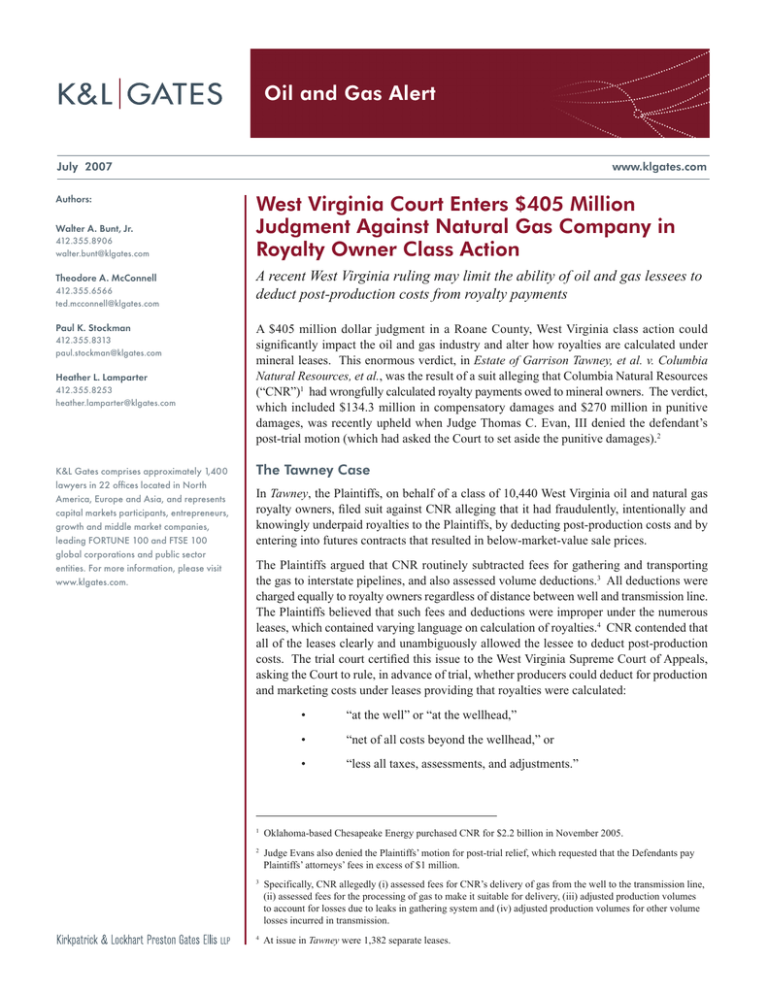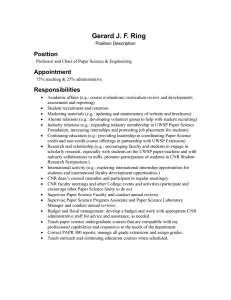
Oil and Gas Alert
July 2007
Authors:
Walter A. Bunt, Jr.
412.355.8906 walter.bunt@klgates.com
Theodore A. McConnell
412.355.6566 ted.mcconnell@klgates.com
Paul K. Stockman
412.355.8313 paul.stockman@klgates.com
Heather L. Lamparter
412.355.8253 heather.lamparter@klgates.com
K&L Gates comprises approximately 1,400
lawyers in 22 offices located in North
America, Europe and Asia, and represents
capital markets participants, entrepreneurs,
growth and middle market companies,
leading FORTUNE 100 and FTSE 100
global corporations and public sector
entities. For more information, please visit
www.klgates.com.
www.klgates.com
West Virginia Court Enters $405 Million
Judgment Against Natural Gas Company in
Royalty Owner Class Action
A recent West Virginia ruling may limit the ability of oil and gas lessees to
deduct post-production costs from royalty payments
A $405 million dollar judgment in a Roane County, West Virginia class action could
significantly impact the oil and gas industry and alter how royalties are calculated under
mineral leases. This enormous verdict, in Estate of Garrison Tawney, et al. v. Columbia
Natural Resources, et al., was the result of a suit alleging that Columbia Natural Resources
(“CNR”)1 had wrongfully calculated royalty payments owed to mineral owners. The verdict,
which included $134.3 million in compensatory damages and $270 million in punitive
damages, was recently upheld when Judge Thomas C. Evan, III denied the defendant’s
post-trial motion (which had asked the Court to set aside the punitive damages).2
The Tawney Case
In Tawney, the Plaintiffs, on behalf of a class of 10,440 West Virginia oil and natural gas
royalty owners, filed suit against CNR alleging that it had fraudulently, intentionally and
knowingly underpaid royalties to the Plaintiffs, by deducting post-production costs and by
entering into futures contracts that resulted in below-market-value sale prices.
The Plaintiffs argued that CNR routinely subtracted fees for gathering and transporting
the gas to interstate pipelines, and also assessed volume deductions.3 All deductions were
charged equally to royalty owners regardless of distance between well and transmission line.
The Plaintiffs believed that such fees and deductions were improper under the numerous
leases, which contained varying language on calculation of royalties.4 CNR contended that
all of the leases clearly and unambiguously allowed the lessee to deduct post-production
costs. The trial court certified this issue to the West Virginia Supreme Court of Appeals,
asking the Court to rule, in advance of trial, whether producers could deduct for production
and marketing costs under leases providing that royalties were calculated:
•
“at the well” or “at the wellhead,”
•
“net of all costs beyond the wellhead,” or
•
“less all taxes, assessments, and adjustments.”
1
Oklahoma-based Chesapeake Energy purchased CNR for $2.2 billion in November 2005.
Judge Evans also denied the Plaintiffs’ motion for post-trial relief, which requested that the Defendants pay Plaintiffs’ attorneys’ fees in excess of $1 million.
2
Specifically, CNR allegedly (i) assessed fees for CNR’s delivery of gas from the well to the transmission line, (ii) assessed fees for the processing of gas to make it suitable for delivery, (iii) adjusted production volumes to account for losses due to leaks in gathering system and (iv) adjusted production volumes for other volume losses incurred in transmission.
3
4
At issue in Tawney were 1,382 separate leases.
Oil and Gas Alert
The West Virginia Supreme Court held that the above
clauses were ambiguous, construed them in favor of
the royalty owner, and held that, without additional
express language, the clauses did not permit the lessee
to deduct production costs. In particular, the Court
stated that if a lease is to allocate production costs
between the lessor and the lessee, the lease “must
expressly provide that the lessor shall bear some part
of the costs incurred between the wellhead and the
point of sale, identify with particularity the specific
deduction the lessee intends to take from the lessor’s
royalty, and indicate the method of calculating the
amount to be deducted.” Estate of Tawney v. Columbia
Natural Resources, L.L.C., 633 S.E.2d 22, 24 (W. Va.
2006) (syllabus ¶ 10).5
The Plaintiffs also argued that CNR wrongfully sold
gas at less than market value. At the crux of this
argument was the so-called “Mahonia deal.” Under
this transaction, CNR entered into two forward or
futures contracts, which provided for the sale of gas
in advance to Mahonia for a fixed price over a fiveyear period. CNR received $400 million in advance
payments because of the Mahonia contracts. CNR
blended the Mahonia contracts with other gas sales,
and royalty owners received royalties based on an
average sales price.
Ultimately, Judge Evans ruled as a matter of law, based
on the Supreme Court’s ruling, (i) that CNR was not
entitled to deduct production and marketing costs, (ii)
that the Plaintiffs were entitled to recover for royalties
lost as a result of CNR’s volume deductions, and
(iii) that CNR was required to pay a 1/8 royalty6 on
all wells, metered and non-metered. As a result, the
principal questions left for the jury to determine were:
(i) whether CNR could properly consider the lower
Mahonia sales numbers when calculating royalties and
(ii) whether CNR was liable for punitive damages. The
jury answered these questions in favor of the Plaintiff
class.
Justification for Punitive Damages
Perhaps the most remarkable factor in Tawney is the
trial court’s allowance of punitive damages. In Tawney,
the Plaintiffs successfully argued that punitive damages
were warranted because CNR had acted fraudulently
in two ways:
• First, the Plaintiffs cited CNR’s royalty
statements that listed $0 as the landowner’s
shared production cost, while CNR in practice
was deducting post-production expenses from
gas sales. The Plaintiffs contended that these
omissions on the statements amounted to
fraudulent concealment.
• Second, the Plaintiffs alleged that Mahonia
did not prudently market the gas in order to
find the highest price and argued that CNR
had only entered into the futures contract in
order to have immediate cash-in-hand to pay
down CNR’s debt from a recent merger.
CNR countered that the Mahonia contracts were
negotiated for record-high prices and allowed CNR to
have immediate cash to expand drilling and conduct
further exploration. CNR further contended that it
should not be penalized because the price of natural gas
rose even further during the contract period and that
it had no duty to disclose the contracts to the royalty
owners. The jury evidently was not convinced by
CNR’s arguments, however, because it assessed the
punitive damage award.
Conclusion
Undoubtedly hoping to benefit from the favorable
certified question opinion, at least four more class
action royalty owner suits have been filed in West
Virginia, and other royalty class actions continue to be
filed in other states. This increase in royalty litigation
serves to remind oil and gas companies that class action
litigation remains a significant concern. Because of the
variety of often-aged lease forms that govern royalty
For a discussion of other jurisdictions’ approach to the deductibility of production and marketing costs from royalties, see, e.g., Annotation, Sufficiency of “At the Well” Language in Oil and Gas Leases to Allocate Costs, 99 A.L.R. 5th 415 (2002).
5
6
By statute in West Virginia, a lessee is entitled to a 1/8 royalty.
July 2007 | Oil and Gas Alert
payments and the multi-state nature of many oil and
gas companies’ operations, this is an intricate area of
the law. Companies, therefore, may be well advised
to consult with experienced counsel who can assist
them in assessing the risk posed by royalty-owner
class actions and in defending against any claims that
may be asserted.
K&L Gates comprises multiple affiliated partnerships: a limited liability partnership with the full name Kirkpatrick & Lockhart Preston Gates Ellis LLP qualified
in Delaware and maintaining offices throughout the U.S., in Berlin, and in Beijing (Kirkpatrick & Lockhart Preston Gates Ellis LLP Beijing Representative
Office); a limited liability partnership (also named Kirkpatrick & Lockhart Preston Gates Ellis LLP) incorporated in England and maintaining our London
office; a Taiwan general partnership (Kirkpatrick & Lockhart Preston Gates Ellis) which practices from our Taipei office; and a Hong Kong general
partnership (Kirkpatrick & Lockhart Preston Gates Ellis, Solicitors) which practices from our Hong Kong office. K&L Gates maintains appropriate registrations
in the jurisdictions in which its offices are located. A list of the partners in each entity is available for inspection at any K&L Gates office.
This publication/newsletter is for informational purposes and does not contain or convey legal advice. The information herein should not be used or relied
upon in regard to any particular facts or circumstances without first consulting a lawyer.
Data Protection Act 1998—We may contact you from time to time with information on Kirkpatrick & Lockhart Preston Gates Ellis LLP seminars and with our
regular newsletters, which may be of interest to you. We will not provide your details to any third parties. Please e-mail london@klgates.com if you would
prefer not to receive this information.
©1996-2007 Kirkpatrick & Lockhart Preston Gates Ellis LLP. All Rights Reserved.
July 2007 |


